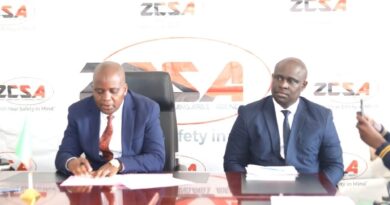Zambia Applauds Global Efforts to Protect the Ozone Layer at 35th Montreal Protocol Meeting
The Acting Director General of the Zambia Environmental Management Agency, Maxwell M. Nkoya, delivered a statement at the 35th Meeting of the Parties (MOP) to the Montreal Protocol, highlighting Zambia’s commitment to environmental protection and ozone layer preservation.
In his address, Nkoya expressed Zambia’s gratitude to the President of the meeting and commended the United Nations Environment Programme (UNEP) for its outstanding work in addressing issues related to substances that deplete the ozone layer and contribute to climate change.
He proudly acknowledged the continued success of the Montreal Protocol in safeguarding the ozone layer and preventing global warming.
Nkoya shared Zambia’s commitment to phasing out ozone-depleting substances and its proactive involvement in ratifying all amendments to the Montreal Protocol, including the Kigali Amendment.
He noted that Zambia has successfully concluded the domestication process of the Kigali Amendment, amending the principal environmental law to include licensing for hydrofluorocarbons (HFCs). Zambia, while not producing ozone-depleting substances and HFC refrigerants, relies heavily on imports.
Refrigeration and air conditioning play a pivotal role in the nation’s economic development, job creation, and public health. Sectors such as mining and agriculture, which are vital to Zambia’s economy, depend on refrigerants for various applications.
Nkoya acknowledged that Zambia has made significant progress in phasing out ozone-depleting substances and is on track to meet the 2030 phase-out targets.
He said that the country is transitioning to ozone and climate-friendly, low global warming potential technologies, despite challenges related to accessibility. Furthermore, Zambia is preparing for the phasedown of HFCs, which is scheduled to begin in 2024.
The Director General highlighted the country’s achievements in reducing hydrochlorofluorocarbon (HCFC) consumption, citing a remarkable 60% reduction from the 2010 baseline. This accomplishment is attributed to measures such as the quota system and licensing of refrigeration technicians.
Zambia has also successfully shifted from ozone-depleting substances to environmentally friendly replacements in the service sector, the largest consumer of refrigerants in the country, emphasizing its support for energy efficiency initiatives.
Nkoya expressed Zambia’s recognition of the role of regional initiatives under the UNEP Ozone Action Programme in capacity building and support for Article 5 countries in their efforts to phase out ozone-depleting substances and reduce HFCs. Zambia reaffirmed its commitment to cooperate with other Montreal Protocol parties to protect the ozone layer and contribute to global environmental preservation.
He said Zambia reiterated its dedication to environmental protection and ozone layer preservation while actively participating in international efforts to combat climate change and ozone layer depletion.



